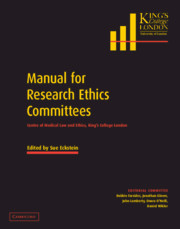Book contents
- Frontmatter
- Contents
- Editorial board
- Acknowledgements
- List of contributors
- Introduction
- Part I
- 1 The ethics of clinical research
- 2 Research ethics committees and the law
- 3 The regulation of medical research: a historical overview
- 4 The regulation of medical research in the UK
- 5 Observational and epidemiological research
- 6 Social survey research
- 7 Approaching qualitative research
- 8 Complementary and alternative medicine: challenges for research ethics committees
- 9 The ethical review of student research in the context of the governance arrangements for research ethics committees
- 10 The ethics of genetic research
- 11 Research or audit?
- 12 Randomised controlled trials
- 13 Determining the study size
- 14 Risk assessment for research participants
- 15 Absorbed radiation in patient and volunteer studies submitted to the ethical committee: a memorandum
- 16 A guide to the use of radioactive materials and radiological procedures for research purposes
- 17 Indemnity in medical research
- 18 The prevention and management of fraud and misconduct: the role of the LREC
- 19 Understanding clinical trials: a model for providing information to potential participants
- 20 The law relating to consent
- 21 Writing information for potential research participants
- 22 The law relating to confidentiality
- 23 Research involving vulnerable participants: some ethical issues
- 24 The ethics of research related to healthcare in developing countries
- Part II
- Index
17 - Indemnity in medical research
Published online by Cambridge University Press: 08 January 2010
- Frontmatter
- Contents
- Editorial board
- Acknowledgements
- List of contributors
- Introduction
- Part I
- 1 The ethics of clinical research
- 2 Research ethics committees and the law
- 3 The regulation of medical research: a historical overview
- 4 The regulation of medical research in the UK
- 5 Observational and epidemiological research
- 6 Social survey research
- 7 Approaching qualitative research
- 8 Complementary and alternative medicine: challenges for research ethics committees
- 9 The ethical review of student research in the context of the governance arrangements for research ethics committees
- 10 The ethics of genetic research
- 11 Research or audit?
- 12 Randomised controlled trials
- 13 Determining the study size
- 14 Risk assessment for research participants
- 15 Absorbed radiation in patient and volunteer studies submitted to the ethical committee: a memorandum
- 16 A guide to the use of radioactive materials and radiological procedures for research purposes
- 17 Indemnity in medical research
- 18 The prevention and management of fraud and misconduct: the role of the LREC
- 19 Understanding clinical trials: a model for providing information to potential participants
- 20 The law relating to consent
- 21 Writing information for potential research participants
- 22 The law relating to confidentiality
- 23 Research involving vulnerable participants: some ethical issues
- 24 The ethics of research related to healthcare in developing countries
- Part II
- Index
Summary
Medical research carries risks for the subjects who take part. The subjects accept these risks, because they are interested in the area of the research and in the general good achieved by better medical knowledge. If the research is a clinical trial, there is also the chance, however random, of obtaining an effective new treatment. From time to time, things go wrong – a trial drug causes harm, an accident occurs, or a subject feels aggrieved – and the investigators may need to find money to redress the wrong. Indemnity involves both protection for the investigator (by various forms of insurance) and the payment to injured parties (if appropriate). This chapter examines these two aspects of indemnity, the first by notes for investigators on the insurance schemes and the second by showing the pathways by which a subject might claim financial compensation.
Forms of indemnity
Indemnity by the employing organisation
National Health Service (NHS) Staff and people who have paid or honorary contracts with NHS hospitals are covered by the NHS indemnity for clinical trials involving NHS patients. This scheme compensates for injury arising from negligence, for example, a failure to follow a research protocol, an accident caused by poor maintenance of a building or harm resulting from personal medical information falling into the wrong hands. In the re-organised NHS, the costs of a successful claim fall primarily on the employing NHS trust, which may have to borrow from the Department of Health to settle very large clinical negligence claims, unless it is a member of the Clinical Negligence Scheme for Trusts (CNST) run by the NHS Litigation Authority (NHSLA).
- Type
- Chapter
- Information
- Manual for Research Ethics CommitteesCentre of Medical Law and Ethics, King's College London, pp. 75 - 78Publisher: Cambridge University PressPrint publication year: 2003



